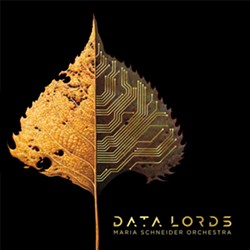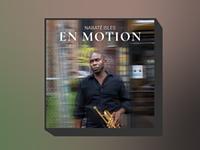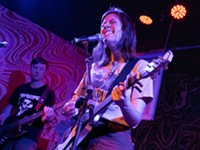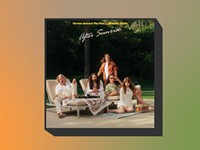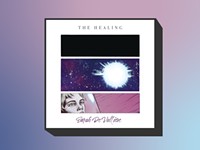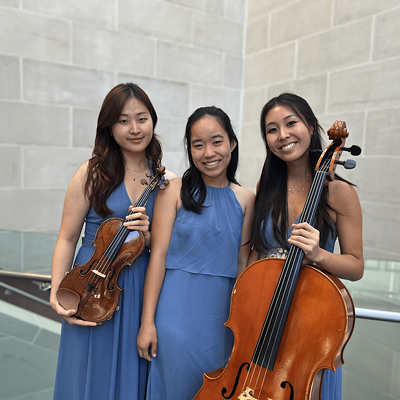[
{
"name": "500x250 Ad",
"insertPoint": "5",
"component": "15667920",
"parentWrapperClass": "",
"requiredCountToDisplay": "1"
}
]
Maria Schneider Orchestra
‘Data Lords’
ArtistShare
mariaschneider.com
The cover of “Data Lords,” the new album by the Maria Schneider Orchestra, features a futuristic hybrid. On one side is the delicate filigree of an autumn leaf — decaying, yet still beautiful. On the other side, in place of the leaf’s veins, are the conductive tracks of a circuit board. The album itself is divided similarly into two discs: the gorgeous, elegiac “Our Natural World” and the dissonant, dystopian “The Digital World.”
When it comes to jazz releases, Schneider’s albums tend to be on the epic side. While great themes have been common for centuries in the classical realm, relatively few jazz artists have released works like Duke Ellington’s “Black, Brown and Beige,” Max Roach’s “Freedom Now Suite” and Wynton Marsalis’s “Blood on the Fields.”
But Schneider — a pianist, composer and bandleader — is no ordinary musician. In 2014 she testified before Congress for the preservation of the artist’s copyright in the digital age. With “Data Lords” she goes further, expressing profound doubts about the future of humanity in a world of computer screens and artificial intelligence.
Schneider, who earned a master’s degree from the Eastman School of Music, is no luddite, railing against every aspect of the digital world. In her beautifully written, 68-page booklet, she shares some positive aspects of the information age, and some of her music reflects that. But much of it deals with the dichotomy she discusses between the ideas of Ray Kurzweil, who believes in “the singularity,” combining humans with computers, and Stephen Hawking, who said in an interview that he fears artificial intelligence could eclipse human beings.
How do you put these complex ideas into music using the vocabulary of a jazz orchestra?
Schneider, who has won five Grammy Awards, is eloquent in that language. “Our Natural World” contains several gorgeous compositions, none more evocative than “Sanzenin.” The music describes an ancient Buddhist temple and its magnificent garden with subtle, orchestral voicings backing the wonderfully wandering accordion solo of Eastman professor Gary Versace.
Those subtle voicings turn ominous on “The Digital World,” showcasing Schneider’s absolute command of the textures and, in this case, dark palette of the jazz orchestra. With echoes of “Taps” occasionally surfacing, “Don’t Be Evil” (the phrase once used as Google’s motto) is relentlessly driving, building to a harrowing climax. That track features superb solos by trombonist Ryan Keberle, guitarist Ben Monder, pianist Frank Kimbrough, and bassist Jay Anderson.
In the truest sense of jazz composition, Schneider’s pieces leave plenty of room for the individual expression of the players. While she supplies the vision and the structure, her orchestra is a living, breathing organism unto itself. It’s a powerful force when playing as a unit, but each of its limbs and tentacles is capable of its own brilliant excursion. It’s been five years since Schneider’s last album. “Data Lords” is well worth the wait — a rich, provocative, major work for our time.
‘Data Lords’
ArtistShare
mariaschneider.com
The cover of “Data Lords,” the new album by the Maria Schneider Orchestra, features a futuristic hybrid. On one side is the delicate filigree of an autumn leaf — decaying, yet still beautiful. On the other side, in place of the leaf’s veins, are the conductive tracks of a circuit board. The album itself is divided similarly into two discs: the gorgeous, elegiac “Our Natural World” and the dissonant, dystopian “The Digital World.”
When it comes to jazz releases, Schneider’s albums tend to be on the epic side. While great themes have been common for centuries in the classical realm, relatively few jazz artists have released works like Duke Ellington’s “Black, Brown and Beige,” Max Roach’s “Freedom Now Suite” and Wynton Marsalis’s “Blood on the Fields.”
But Schneider — a pianist, composer and bandleader — is no ordinary musician. In 2014 she testified before Congress for the preservation of the artist’s copyright in the digital age. With “Data Lords” she goes further, expressing profound doubts about the future of humanity in a world of computer screens and artificial intelligence.
Schneider, who earned a master’s degree from the Eastman School of Music, is no luddite, railing against every aspect of the digital world. In her beautifully written, 68-page booklet, she shares some positive aspects of the information age, and some of her music reflects that. But much of it deals with the dichotomy she discusses between the ideas of Ray Kurzweil, who believes in “the singularity,” combining humans with computers, and Stephen Hawking, who said in an interview that he fears artificial intelligence could eclipse human beings.
How do you put these complex ideas into music using the vocabulary of a jazz orchestra?
Schneider, who has won five Grammy Awards, is eloquent in that language. “Our Natural World” contains several gorgeous compositions, none more evocative than “Sanzenin.” The music describes an ancient Buddhist temple and its magnificent garden with subtle, orchestral voicings backing the wonderfully wandering accordion solo of Eastman professor Gary Versace.
Those subtle voicings turn ominous on “The Digital World,” showcasing Schneider’s absolute command of the textures and, in this case, dark palette of the jazz orchestra. With echoes of “Taps” occasionally surfacing, “Don’t Be Evil” (the phrase once used as Google’s motto) is relentlessly driving, building to a harrowing climax. That track features superb solos by trombonist Ryan Keberle, guitarist Ben Monder, pianist Frank Kimbrough, and bassist Jay Anderson.
In the truest sense of jazz composition, Schneider’s pieces leave plenty of room for the individual expression of the players. While she supplies the vision and the structure, her orchestra is a living, breathing organism unto itself. It’s a powerful force when playing as a unit, but each of its limbs and tentacles is capable of its own brilliant excursion. It’s been five years since Schneider’s last album. “Data Lords” is well worth the wait — a rich, provocative, major work for our time.
Speaking of...
Latest in Music Reviews
More by Ron Netsky
-

Album Review | 'Bizet: Carmen in Jazz'
Mar 26, 2024 -
'To Swing Is the Thing" by Mike Melito
Aug 10, 2023 - More »
